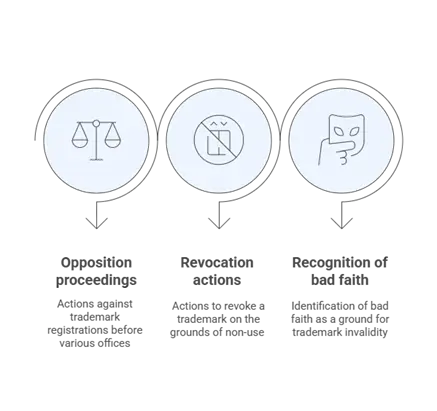Sommaire
Introduction
The term “trademark troll” refers to opportunistic actors who exploit trademark law for speculative or coercive purposes. This article examines the definition of trademark trolls, the dangers they represent, the means of protection against them, and the question of their potential strategic value.
Understanding trademark trolls
Definition and essential characteristics
A trademark troll files a mark without any genuine intention of use, with the aim of demanding royalties, blocking market access, or exerting legal pressure.
Origins: from patent trolling to trademark trolling
Inspired by practices in the field of patents, this misuse relies on the “first-to-file” principle. Trolls take advantage of companies’ delays or oversights to pre-empt their filings.
Why trademark trolls are dangerous
Legal and commercial risks
Such practices generate costly litigation, slow down innovation, and force businesses into unjustified financial concessions.
Concrete examples
- Snapchat vs. 47/72 Inc.: the filing of “OH SNAP! CHAT” risked diverting Snapchat’s image.
- Castel frères in China: fraudulent pre-registration of the name “Ka Si Te” led to penalties and market losses.
- Apple-proview: Apple was forced to pay USD 60 million to secure the “iPad” trademark in China.
How to protect against trademark trolls
Proactive filing strategies
An effective policy includes:
- Early filing of key trademarks.
- Coverage of all relevant classes.
- Active monitoring to detect suspicious filings.
Legal remedies and procedural safeguards
Available tools include:
- Opposition proceedings before INPI, EUIPO, or other trademark offices.
- Revocation for non-use actions.
- Recognition of bad faith, illustrated by the recent EUIPO decision invalidating a fraudulent “TESLA” filing.
In 2022, Tesla filed a cancellation action against the European trademark “TESLA,” registered by Capella Eood, a company associated with an individual known for “trademark trolling” practices. Tesla argued that Capella Eood employed speculative strategies to register trademarks in order to block other companies’ operations and extort financial settlements. The EUIPO’s Cancellation Division held that the mark had been filed in bad faith and declared it invalid.
For more information on this matter: https://www.dreyfus.fr/en/2025/01/06/tesla-and-the-euipo-halt-trade-mark-trolling/
Trademark trolls: A possible strategy?
Opportunism or legitimate filing
While trolls act for speculative purposes, some defensive filings may be considered strategic, provided they rest on a genuine intention of use.
Regulatory responses and recent case law
Offices and courts are progressively reinforcing the fight against abusive practices. The Tesla/Capella Eood decision confirms Europe’s determination to sanction speculative filings.
Conclusion
Trademark trolls represent a growing threat for businesses. Only proactive protection strategies and swift legal responses allow companies to safeguard their intangible assets.
Dreyfus Law firm assists its clients in managing complex intellectual property cases, offering personalized advice and comprehensive operational support for the complete protection of intellectual property.
Dreyfus Law firm is partnered with a global network of lawyers specializing in intellectual property.
Nathalie Dreyfus with the assistance of the entire Dreyfus team.
FAQ
What is a trademark troll?
A trademark troll is a filing made without any real intention of use, solely to block or monetize rights.
What are the risks associated with trademark trolls?
They lead to costly litigation, delay market entry, and impose unjustified financial concessions.
How can a fraudulent filing be anticipated?
By filing trademarks early and implementing active monitoring systems.
What remedies are available in France and Europe?
Opposition proceedings, non-use cancellation actions, and claims based on bad faith.
Is revocation for non-use an effective tool?
Yes, it is an effective means of cancelling trademarks held by trolls.
Should start-ups fear trademark trolls as much as large corporations?
Yes, because their financial vulnerability and growing visibility make them particularly exposed.
What is the difference between a defensive filing and a troll filing?
A defensive filing aims to protect legitimate use, while a troll filing relies on abusive speculation.


